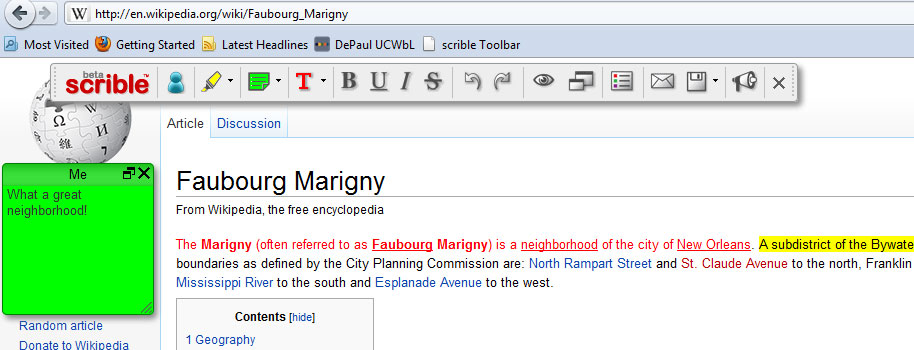Software that allows you to annotate, save and share websites with others not only makes web research more manageable but allows for greater opportunities for collaboration. Sites like Diigo and Scrible both allow you to mark up, save and share websites with comments and highlighted text.
Scrible offers more options for markup than Diigo by including the ability to change the colors of the highlighter and text as well as add emphasis:

On the other hand, sharing is easier with Diigo. Whereas Scrible only allows you to share pages by e-mail, Diigo allows for sharing via direct link, Twitter, Facebook and its own social network. Indeed, collaboration is easier with Diigo in large part due to the ability to create groups, both public and private. Members of groups can share links to their marked up websites with comments a la Facebook’s Wall:
Both services offer free and premium types of service. With Diigo you can create unlimited bookmarks for free but if you want access to full-text search and some other options you’ll have to upgrade. Currently Scrible is free for up to 125 megabytes but once you cross that threshold you’ll need to delete content or upgrade (the premium option is still TBD).
Overall I think I’ll stick with Diigo because of the ability to create public and private groups. To me, changing the font style is not as important as being able to easily share ideas and links with other people.
Discover more from UCWbLing
Subscribe to get the latest posts sent to your email.


4 replies on “Tools for annotating and sharing on the web”
How does Scrible compare/contrast with Diigo? I’ve been recommending the latter to faculty members for a while now, and after looking at both websites I’m having a hard time telling them apart.
You’re right, Zac, Scrible and Diigo have much the same features. Just from a cursory look at Diigo, it looks like it offers more options for collaboration than Scrible. For instance, Diigo offers users the the option to create public knowledge repositories. Thanks for pointing out another great web annotation/collaboration option!
Zac, I’ve spent some time with Diigo and edited the post to reflect a review of both. I like Diigo better, thanks for pointing it out to me.
Cool, thanks for the helpful post, Joe!